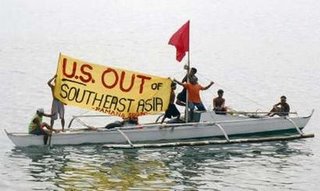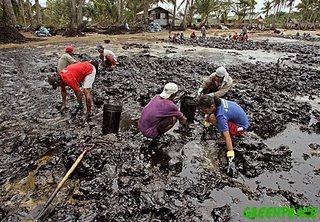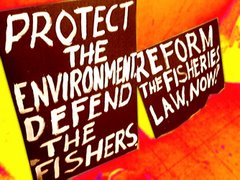

photos by May Macapobre
PAMANA(Panaghugpong sa Gagmay'ng Mananagat sa Sugbo) together with FIDEC and other fisherfolk groups denounce US participation in the ASEAN summit by holding a protest on board fishing boats and swimming along the Mactan channel.

photo from Reuters
MEDIA RELEASE
Nov. 28, 2006
STOP US INTERVENTION IN THE ASEAN. US OUT OF SOUTH-EAST ASIA NOW.
We condemn US blatant intervention inthe ASEAN. No less than the DFA and DTI confirmed Pascal Lamy director generalof WTO will be at Cebu during thesummit to urge ASEAN leaders’ assistancein resuming stalled WTO talks.
It is also a clear indication that themoves of WTO is in consonance with USPresident George Bushs’ call for the exploration into the creation of atrans-Pacific, region-wide Free TradeArea of the Asia-Pacific- - reportedlythe largest free-trade agreement ever conceived.
The Bush administration had also signedin 2005 a US-Association of SoutheastAsian Nations (ASEAN) EnhancedPartnership Agreement (EPA) whose main objectives are to increase security and political cooperation and enhance trade and investment flows as well as strengthening the investment climate inASEAN to encourage US investment in the region.
Such liberalization and integration efforts are less about strengthening ASEAN as an economic and political bloc than they are about allowing US transnational corporations the greatest freedom to locate their investments interms of cheap labor and resources, access to markets and geography.
US-ASEAN EPA led to the signing of a US-ASEAN Trade and Investment Framework Agreement (TIFA) in September 2006 that lays the groundwork for an eventual US-ASEAN free trade agreement. Such an agreement could demand a level of liberalization even higher than that ofthe World Trade Organization (WTO) andthus, cement US economic control over Southeast Asian countries. Southeast Asia is essential to theUnited States (U.S.) for securing its geopolitical and economic interests not only in East Asia and the Pacific but beyond to South Asia, Central Asia andeven West Asia (or the Middle East). A sustained American military presence in the region is indispensable; an economic presence is likewise vital, both for the regional alliances that they underpin and the super profits that they directly generate.
These interests are what motivate theU.S.’ engagement in the Association ofSoutheast Asian Nations (ASEAN). The grouping itself was created by the U.S.as a Cold War line of defense.The U.S. has also become the dominant economic power in the region. In the last five to six years it has overtaken Japan as the region’s biggest source offoreign direct investment (FDI). Total U.S. FDI in the region over the period1995-2003 sums to $35.7 billion or 16.3 percent of total FDI in Southeast Asia--followed by Japan ($28 billion or 12.7 percent of the total) and the UK ($25.8billion, 11.7 percent).
The U.S. is also ASEAN’s largest trading partner where, at $1.2 trillion over the decade 1995-2004, it accounted for 14.7 percent of total ASEAN two-way trade (i.e. import and export) outside Southeast Asia. All these investments have been in the service of creating a FirstWorld-dominated region-wide production base through dispersed industrial enclaves or so-called export processing zones. American, Japanese and European transnational corporations (TNCs) have taken advantage of economic globalization to fragment their production processes across SoutheastAsia and set up firms and domestic enterprises in the form of subsidiaries, affiliates and subcontractors.
Also on the agenda are the approval of a“blueprint” for the proposed ASEANCharter and the creation of a draftingcommittee for this towards completion intime for the 13th Summit in Singapore inDecember 2007. The proposed ASEANCharter aims, among others, to tighten organizational structures and establish more formal decision-making processes which would facilitate the implementation of region-wide interventions.
The Philippines is also pushing to discuss energy security including opening up access to the region’s oiland liquefied natural gas resources;Indonesia, Brunei, Malaysia, Vietnam and the Philippines are known to have rich oil and gas reserves. In concrete,Visayan fishermen have experienced this such as what is happening right now; offshore drilling in the protected seascape of Tañon and Cebu Bohol Strait. All these initiatives make it clear what the essential agenda of the 12thSummit is: to increase U.S. military presence and to deepen neoliberal globalization in Southeast Asia.
Executive Committee
Panaghiusa sa Gagmay’ng Mangingisda sa Sugbo
PAMANA Sugbo
09062955971 – (032)256-1365








